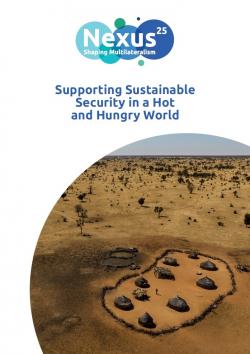Supporting Sustainable Security in a Hot and Hungry World
Policymakers are increasingly acknowledging the impact of transnational challenges, such as food and climate issues, on driving conflicts. The global famine has reached unprecedented levels, highlighting the intricate connections between hunger, climate change, and global security. The escalating violence in Africa, the Middle East, and Russia's invasion of Ukraine, coupled with the visible impact of climate change, exacerbates global food insecurity. Despite the challenges, food presents an opportunity for multilateral cooperation. The process of mainstreaming food security into multilateral processes has begun, but significant gaps remain, particularly in the limited allocation of climate finance to green transitions in food systems. This paper emphasizes the long-term and systemic nature of food security challenges, driven by development, security, governance, and environmental factors. Conflict can worsen hunger, and food insecurity can increase security risks, particularly for vulnerable populations. In addition, terrorist organizations may use food as a means of recruitment and control. Therefore, it is important to integrate food security into interventions and climate finance efforts, and to have a comprehensive understanding of the interplay between food security, climate risks, political instability, and conflict. To move forward, it is important to recognize food as a predictive tool, shift away from donor-driven approaches, and discourage policy silos in order to address the intersection of hunger, climate, and security.
-
Details
Nexus25 MSC Brief, February 2024, 5 p.
Topic
Tag
SDGs
Related content
-
Event23/02/2024
Nexus25 - Munich Security Conference side event
leggi tutto -
Ricerca07/12/2021
Nexus25 - Shaping Multilateralism
leggi tutto



